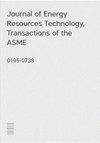Effect of Instantaneous Starting Pump on Fluid Transient Flow in Managed Pressure Cementing
IF 2.4
3区 工程技术
Q3 ENERGY & FUELS
Journal of Energy Resources Technology-transactions of The Asme
Pub Date : 2023-08-31
DOI:10.1115/1.4063327
引用次数: 0
Abstract
The fluctuating pressure generated by the instantaneous starting pump of cementing operation might easily cause formation fracture in narrow safety window formations. Accurate transient fluctuating pressure calculation and dynamically managed backpressure are required to achieve precise control of wellbore pressure in managed pressure cementing. Considering the transient flow characteristics of cementing fluids in the wellbore, unsteady transient friction, and the variation of high pressure-high temperature (HTHP) cementing fluid properties, a transient flow mathematical model of instantaneous starting pump during managed pressure cementing is established, and the method of characteristics is used for solution. Based on tht established model analyzes the magnitude and variation of wellbore pressure under different model factors, temperature conditions, pump start duration, and target pump flowrate, which can achieve more accurate analysis of transient flow. The pressure and flow fluctuations generated during the instantaneous starting pump of cementing are significant, and the dynamically managed wellhead backpressure can effectively control the wellbore pressure in the safe pressure window formations. This can reduce the risk of well leakage and provide reliable technical support for safe operations of instantaneous starting pumps during managed pressure cementing.控压固井中瞬时启动泵对流体瞬态流动的影响
在安全窗较窄的地层中,固井作业瞬时启动泵产生的压力波动很容易引起地层破裂。在管理压力固井中,为了实现井筒压力的精确控制,需要精确的瞬态波动压力计算和动态管理背压。考虑固井液在井筒中的瞬态流动特性、非稳态瞬态摩擦以及高压高温(HTHP)固井液性质的变化,建立了管理压力固井过程中瞬时启动泵的瞬态流动数学模型,并采用特征法进行求解。在此基础上,建立的模型分析了不同模型因素、温度条件、泵启动时间和目标泵流量下井筒压力的大小和变化,可以实现更准确的瞬态流量分析。固井瞬时启动泵过程中产生的压力和流量波动很大,动态管理的井口背压可以有效控制安全压力窗口地层中的井筒压力。这可以降低油井泄漏的风险,并为管理压力固井过程中瞬时启动泵的安全操作提供可靠的技术支持。
本文章由计算机程序翻译,如有差异,请以英文原文为准。
求助全文
约1分钟内获得全文
求助全文
来源期刊
CiteScore
6.40
自引率
30.00%
发文量
213
审稿时长
4.5 months
期刊介绍:
Specific areas of importance including, but not limited to: Fundamentals of thermodynamics such as energy, entropy and exergy, laws of thermodynamics; Thermoeconomics; Alternative and renewable energy sources; Internal combustion engines; (Geo) thermal energy storage and conversion systems; Fundamental combustion of fuels; Energy resource recovery from biomass and solid wastes; Carbon capture; Land and offshore wells drilling; Production and reservoir engineering;, Economics of energy resource exploitation

 求助内容:
求助内容: 应助结果提醒方式:
应助结果提醒方式:


